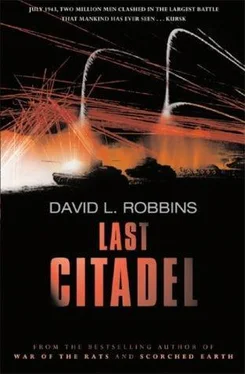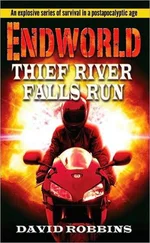‘Captain de Vega,’ Breit said. His tone was clipped. ‘Thank you for coming. Major Grimm has been telling me you’re an impressive young man.’
Major Grimm piped up. ‘You should have seen him, Colonel. His planning was impeccable.’
Grimm said nothing more. There was no mention of the killings by the rail mound. Luis supposed they had been covered earlier by the major. But Breit held on to Luis’s hand for a longer moment, nodding into Luis’s eyes, seeing something there he approved of. There was much unspoken about this SS colonel.
Breit let go of Luis’s hand.
‘Captain, let me bring you up-to-date on the situation around Kursk.’
The staff officer turned to indicate the giant map and all its pieces. Thoma came to stand beside Luis, Major Grimm sidled around to the Soviet side of the chart.
‘As you know,’ Breit said, ‘Germany has spent two summers now in the Soviet Union. We have not succeeded in destroying the Red armies as we’d planned. In fact, now in our third summer here, it has become unlikely we will do better than a stalemate on the Eastern Front.’
Luis stiffened at this candidness, smacking of defeatism. Breit cocked his head and smiled in his taut way again.
‘Captain de Vega, don’t be shocked. You’ve been away from the war for a year now, recuperating. The situation here in Russia is common knowledge, at least among the general staff. We keep up appearances among the men, of course, but we are officers here. You understand?’
This was the first time Luis had heard this view expressed as an official stance. He knew the coming entry of the Americans into the war made it urgent that Germany win in Russia this summer, at this battle. But now, to hear there was no victory to be had at all in Russia, simply a stalemate? What would happen after the Americans landed in Europe to his chances of returning home a conqueror? What will they say on the Ramblas in Barcelona to a tie? A million dead and ruined, for this? The notion lay rancid on his tongue. The bull must always die. When is it allowed to call a draw?
Thoma laid a hand on Luis’s shoulder. The touch said, Don’t worry, brother. These are not fighters like you and I. We will be the ones to decide, not them.
Luis swallowed. He indicated the map and Colonel Breit.
‘I apologize, sir. Please continue.’
The colonel resumed. ‘The question has been, what strategy will achieve for Germany the best political solution of the war? Our defeat at Stalingrad last winter cost us more than just men and weapons. Germany lost the initiative. Some of our allies have been looking for the back door out of their support for us. Romania and Italy have both contacted the Allies with peace feelers. Turkey is sitting on its hands and has decided not to attack the Soviet Union in the Caucasus, though they had agreed to do so. Japan is up to its neck with the Americans in the Pacific and is therefore upholding its non-aggression pact with Russia. And Finland has made entreaties to Stalin for a separate peace. Under these circumstances, Captain de Vega, you can see why Germany cannot sit back this summer. For both military and political reasons, we need an offensive on the Eastern Front to reclaim our momentum.’
Luis asked, ‘Sir, tell me about the Americans in Europe.’
‘Italy,’ Breit answered, shaking his head. ‘The Americans will invade Italy, most likely Sicily, and they’ll do it soon. This summer, certainly. When they do, the only place the Führer will be able to find troops to fend them off is here, the Eastern Front.’ Breit pointed down to the map, speaking to the German black blocks now, as though urging them. ‘If we haven’t broken through to Kursk before the Americans land in Europe, Hitler will almost certainly call off the attack. He will bleed off units from Citadel and send them to Italy. To Mussolini.’
Breit left his finger dangling above the map, contemplating the impact of such a thing.
‘Then,’ he said, lowering his voice and his hand as though lowering a flag, ‘I can make no predictions for Germany’s future.’
The colonel dug into his jacket for a cigarette. Major Grimm took over now. He raised one arm, a counterpoint to Breit’s deflated half-mast, and moved his flattened hand over the map’s terrain like a scudding cloud.
‘But we are going to attack, gentlemen. It will be fast and it will be magnificent, with more force than Germany has ever assembled. And the Americans can go hang. Right?’
Colonel Breit’s quiet face flared behind a flickering match. Thoma filled the void, responding with ‘Right.’ Luis said nothing and Thoma raised his eyebrows at him. Grimm said, ‘Take a look here, at the front line, stretching from Leningrad to Rostov. It doesn’t take much to see the best place for us to strike.’ He turned his flat hand into a pointing finger, as if the cloud had released one large drop of rain.
‘Here,’ he said, looking up at Luis. ‘Our target is Kursk. Operation Citadel.’
Luis brought his gaze down to the map and saw how right Grimm was, how easily the decision must have been made. The Soviet lines projected into German-held territory as though kicked into them by a mule. On the northern border of the bulge sat the city of Orel, in the south lay Belgorod. A straight axis drawn between the two cities met in the middle of the bulge, at Kursk.
‘We’ll attack from the north out of Orel,’ Grimm said, ‘and out of the south from the area west of Belgorod. If we can meet at Kursk, we’ll have wiped out two Soviet front armies.
After a successful pincer action on Kursk, we’ll be able to straighten our lines, shortening them by a hundred and fifty miles. These are men and materiel we will need elsewhere. As Colonel Breit mentioned, the Americans are expected to land soon in Italy. Once we have Kursk, we can send our forces south to fight off the Allies for Mussolini.’
Colonel Breit sucked loudly on his cigarette. Grimm stepped back and Breit trod up to the map.
‘At first, it was discussed that our forces should wait on a Russian summer offensive. We would grind them down and then go on the offensive ourselves. Take them ‘on the backhand,’ Field Marshal von Manstein has called it. But it’s been decided by Hitler that we will be the ones to go on the attack. The ‘forehand,’ so to speak. And so…’ Breit swept his own hand over the map, ‘…here we are. Looking at the same chart the Russians are looking at. They know exactly what we intend, and where. History, it seems, will have it no other way’
The four officers stood around the huge map, sombered by the notion that they stood at a pivot point in world events. Luis looked to Thoma. The young officer seemed to be calculating the coming clash, his eyes shrewdly tagging the positions and strengths displayed in red and black blocks. He did not appear to Luis to be daunted, though some of the devil-may-care and dash in the set of his spine was gone.
Thoma spoke to Breit. ‘Colonel, may I?’
The officer nodded.
Thoma turned to one of the orderlies. He took from the boy the long stick. The tank captain addressed Luis.
‘The Reds have about one and a half million men inside the salient.’
He reached out the stick and tapped several red bits and flags inside the bulge, bearing the names Voronezh Front, Central Front, and Steppe Front.
‘We’ve got eight hundred thousand men. That’s a two-to-one advantage for the Russians.’
Thoma took in all the German positions with a wave of the stick like a wand. The ebony blocks were spread north, middle, and south, while the crimson ones concentrated in the middle. The blocks were clotted in each color, crowding each other for space on the map.
‘We’ve got ten thousand artillery pieces,’ Thoma said. ‘The Reds have twenty thousand. Two-to-one again. Facing our twenty-five hundred tanks and self-propelled assault guns, the Russians have five thousand.’ He lowered the stick and grinned at Luis. ‘I believe the math speaks for itself.’
Читать дальше












